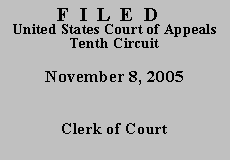

| UNITED STATES OF AMERICA, |
|
| v. | |
| JESUS ROBLES-MUNOZ, |
In Anders the Supreme Court set forth the procedure that an appointed attorney must follow if he seeks to withdraw from an appeal based on his conclusion that the appeal has no merit:
[I]f counsel finds his [client's] case to be wholly frivolous, after a conscientious examination of it, he should so advise the court and request permission to withdraw. That request must, however, be accompanied by a brief referring to anything in the record that might arguably support the appeal. A copy of counsel's brief should be furnished the indigent and time allowed him to raise any points that he chooses.
386 U.S. at 744.
On May 23, 2005, counsel moved to withdraw from the case and filed an Anders brief. At that time, counsel also moved to appoint a translator to translate the brief into Spanish so that Robles, whose English ability is limited, could review the brief as required by Anders. The court denied the motion to appoint a translator and notified Robles that his attorney had moved to withdraw from the case and that he had thirty days to respond to the motion and Anders brief. Robles did not personally submit any response, but on August 16, 2005, his attorney informed the court that the brief and withdrawal motion had been translated for Robles and that Robles did not wish to pursue the matter any further in this court. Based on counsel's representations, we find that Robles has been furnished a copy of the brief and has had ample time to raise any points in response.
We now turn to our own, "full examination of all the proceedings," id., and conclude that the appeal is frivolous. On September 9, 2004, Robles was indicted for various drug-related offenses. He filed no pretrial motions and pled guilty to one count of cocaine distribution. In a written plea agreement, the defendant agreed to cooperate with the government, and the government agreed to (1) dismiss the remaining counts and not prosecute him further for this or related conduct, (2) recommend a "lower end" sentence, and (3) seek a downward departure if, in its sole discretion, Robles provided substantial assistance. The agreement also contemplated a tentative sentencing guideline range of 15 to 21 months, but it is clear that Robles understood the guideline range could be as low as 12 or as high as 41 months. On November 15, 2004, the court accepted the plea in a typical plea colloquy.
Prior to sentencing, however, the Probation Office issued a Presentence Report that indicated that Robles's prior criminal history made him a career criminal, which increased the guideline range to 151 to 188 months. In light of this increase, counsel filed a motion for a downward departure or, in the alternative, to withdraw the plea. The government did not oppose this motion.
By the time of sentencing on January 28, 2005, the Supreme Court had issued its opinion in United States v. Booker, 125 S. Ct. 738 (2005). At sentencing, the district court granted the downward departure and applied the advisory sentencing guidelines to find a sentencing range of 18 to 24 months. The government made no recommendation as to the appropriate sentence because counsel for Robles agreed that a recommendation was not necessary "in light of the factors that developed" since the plea agreement. After considering the factors set forth in 18 U.S.C. § 3553(a), the court imposed a 24-month sentence, stating that "although I found it appropriate to depart downward, nevertheless I think under the circumstances of this case and the application of the statute, a sentence at the high end of the Guideline range is most appropriate." (R. Vol. III, pp. 1617.) Robles asked his attorney to appeal, which he did.
Having reviewed the record before us, we agree the appeal is wholly frivolous. The district court made no pretrial rulings that could be appealed. We see nothing improper about the government's conduct at the change of plea hearing or its satisfaction of the plea agreement. The only possible breach is that the government did not recommend a "lower end" sentence as required by the plea agreement. However, the record makes clear that Robles, through his attorney, released the government from this obligation in light of its stipulation to his departure motion.
Likewise with the sentencing hearing, we see no meritorious issues. It appears that the district court considered the § 3553(a) factors, including the sentencing guidelines, which it treated as advisory. The calculated guideline range was 151 to 188 months, but the court granted a significant downward departure, reducing the range to 18 to 24 months. Because the district court treated the guidelines as advisory, we see no Booker error, so the only remaining argument would be that a 24-month sentence imposed was substantively "unreasonable." Given the significant departure from the calculated guideline range, the facts that came out at the sentencing hearing, and the absence of any unusual § 3553(a) factors, we agree any challenge based on reasonableness would be frivolous.
Accordingly, we GRANT the motion to withdraw and DISMISS the appeal.
Entered for the Court
Timothy M. Tymkovich
Circuit Judge
*. This order is not binding precedent, except under the doctrines of law of the case, res judicata, and collateral estoppel. The court generally disfavors the citation of orders; nevertheless, an order may be cited under the terms and conditions of 10th Cir. R. 36.3.
2. After examining the briefs and the appellate record, this three-judge panel has determined unanimously that oral argument would not be of material assistance in the determination of this appeal. See Fed. R. App. P. 34(a); 10th Cir. R. 34.1(G). The cause is therefore ordered submitted without oral argument.